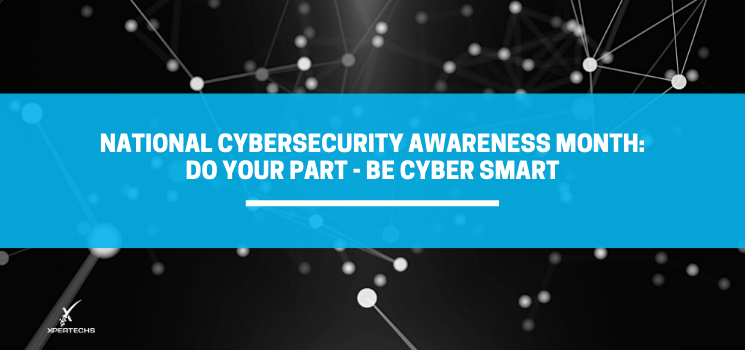National Cybersecurity Awareness Month: Do Your Part – Be Cyber Smart

October is National Cybersecurity Awareness Month (NCSAM), and the theme for 2020 is – “Do Your Part. #BeCyberSmart.” NCSAM is in its 17th year and in the years since it was launched by the National Cyber Security Alliance, its mission has been to promote safe behaviors so that Americans can act responsibly and stay safe as they use the internet in their work and personal lives.
What is Cybersecurity Awareness?
You might wonder why we need awareness when it comes to using the internet. After all, you just turn it on, and you’re connected – but that’s exactly why we need cybersecurity awareness!
For all the good that the internet brings us, there’s a whole lot of potential bad that can happen because cyber predators are looking for an opportune moment to ruin your day by kidnapping, stealing or damaging what belongs to you – be that money, information, reputation or even your identity!
Cybersecurity awareness is about understanding how our actions can keep data and networks safe. It’s about becoming better at recognizing potential threats and knowing what to do if something does happen. As this year’s NCSAM theme points out, awareness is increasingly about understanding that everyone has responsibility for safe behavior when it comes to the internet.
Week 1 Theme – If You Connect It, Protect It
The theme for the first week of NCSAM is “If You Connect It, Protect It” and that coincides with the increasing need to pay attention to the security of any device that’s connected to a network – be it a laptop, smart device, office equipment, wearable device or your children’s electronic games. We call these endpoints.
Endpoints can be vulnerabilities because people don’t realize that they should be locked down. Sometimes IT departments aren’t knowledgeable about how network management strategies can minimize exposure. Oftentimes, people are unaware that their devices have a password that should be changed upon installation, or if they do know, they don’t practice good password management.
Some endpoints just aren’t built to be secure so even if there is a password, the end user might not be able to change it. California was the first state to enact a law stating that manufacturers of connected devices need to have reasonable security that users can manage. However, it’s going to take a while for higher security standards for Internet of Things (IoT) devices to take hold.
Cybersecurity Resources to Share
You can learn more about National Cybersecurity Awareness Month on their website. Through the month of October we’ll be publishing articles about endpoint protection on our blog. Additionally, we have several articles on our website that can help you to increase your cybersecurity literacy.
Just click on a link below to become better informed about both technical and non-technical security tactics, and share them with your colleagues, family and friends.
Executive Education
- 3 Reasons Why SOC 2 Compliant Managed IT Service Companies Should Be on Your Vendor Shortlist
- Find Out if Your IT Team is Keeping Up with Cybersecurity
- Can You Afford the Cost of Neglecting Cybersecurity?
Security Policies
- 3 Reasons Why You Need Policies to Communicate Security Expectations to Your Remote Workforce
- Lack of Security Policies = Cybersecurity Red Flag
- Three Essential Non-Technical Parts of Your Cybersecurity Plan
Security Tactics
- What to Do If You Fall For a Phishing Scam
- Time to Control Your Domain Neighborhood
- Multi-Factor Authentication: Unnecessary Annoyance or Critical Security Layer?
- 4-Point Security Analysis for Your Remote Workforce
Cybersecurity Awareness Training
We’re really glad to help spread the word about National Cybersecurity Awareness Month, but concentrating on this topic one month a year isn’t going to keep security top of mind all the time. The best way for companies to avoid becoming a victim of a cyber attack due to human behavior is to have ongoing cybersecurity training for all employees starting with the CEO.
Here at XPERTECHS, we include this training for clients enrolled in our DEFEND cybersecurity services, and we offer it to all clients as an add-on. The program that we subscribe to is customized to each individual, allowing companies to identify the people who are least savvy about recognizing a potential social engineering scheme, and following up with the practice that’s needed to turn a person from a weak layer of security, into an advocate for safety and risk management.
Less Than Confident About Security?
If you’re not sure if your level of cybersecurity is matching up with your level of risk, talk to us about scheduling a Security Assessment. We’ll help you uncover gaps and give you an objective viewpoint on how your IT team is helping you manage the risk of a cyber attack.
